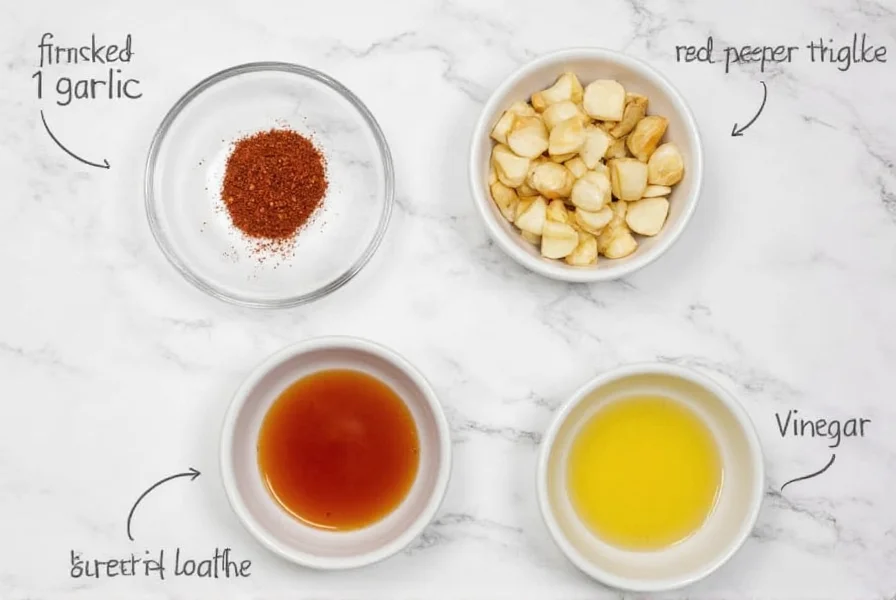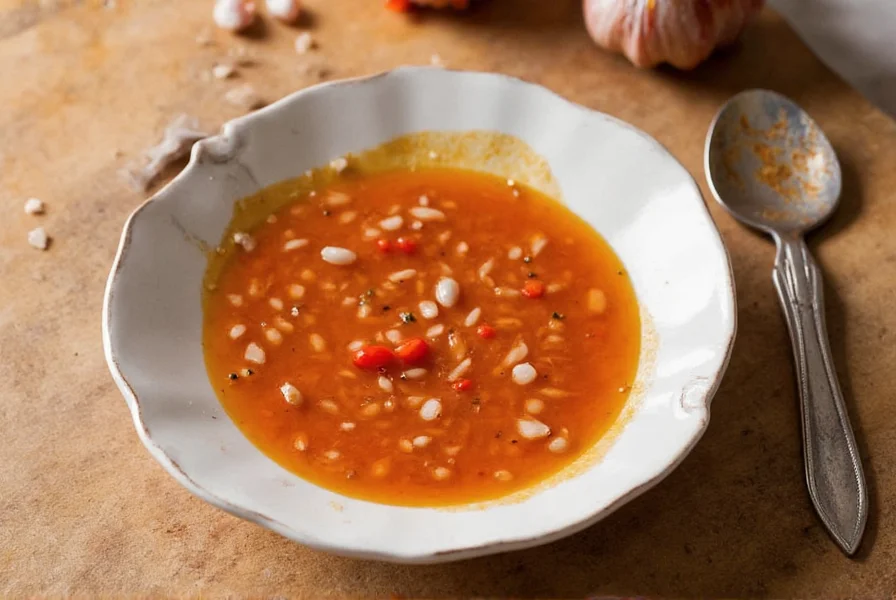Chili garlic sauce is a staple in many Asian kitchens, prized for its perfect balance of spicy heat and pungent garlic flavor. When you're in the middle of cooking and realize you've run out, knowing effective alternatives can save your recipe. This guide provides practical chili garlic sauce replacement options with specific ratios and usage recommendations.
Understanding Chili Garlic Sauce Flavor Profile
Before selecting a substitute, it's important to understand what makes chili garlic sauce unique. This condiment typically contains:
- Fresh red chilies (providing medium heat)
- Garlic (giving that distinctive pungent flavor)
- Vinegar (for acidity and preservation)
- Sugar (balancing the heat)
- Salt (enhancing overall flavor)
A good substitute should replicate this balance as closely as possible for your specific cooking application. The ideal chili garlic sauce alternative depends on whether you need it for stir-fries, marinades, dipping sauces, or other culinary uses.
Historical Evolution of Chili-Based Condiments
Chili garlic sauce's development reflects centuries of culinary adaptation. As documented by the USDA Agricultural Research Service, chili peppers were introduced to Asia by Portuguese traders in the early 16th century, fundamentally transforming regional cuisines (USDA Historical Documentation). This timeline shows key milestones:
- 1542: Portuguese traders bring chili peppers to Goa, India, initiating their spread across Asia
- 1600s: Chili-garlic pastes become integral to Sichuan cuisine after peppers reach China via maritime trade routes
- 1980: Huy Fong Foods establishes commercial production of chili-garlic condiments in the US (Huy Fong Foods)
- 2000s: Globalization drives Western supermarket availability of sambal oelek as primary substitute base
- 2015-Present: Artisanal food movements increase demand for customizable homemade versions
This evolution explains why certain substitutes like sambal oelek work effectively—they share historical roots with traditional preparations, unlike modern hot sauces developed for different culinary contexts.
Top 5 Effective Chili Garlic Sauce Substitutes
1. Minced Garlic + Red Pepper Flakes + Vinegar (Best All-Around Substitute)
This homemade alternative gives you control over the heat level and garlic intensity. For every tablespoon of chili garlic sauce required:
- 1 teaspoon minced fresh garlic (or ½ teaspoon garlic powder)
- ¼-½ teaspoon red pepper flakes (adjust to heat preference)
- 1 teaspoon rice vinegar or white vinegar
- ½ teaspoon sugar
- Pinch of salt
Mix these ingredients thoroughly before adding to your recipe. This combination works particularly well as a substitute for chili garlic sauce in stir-fries and noodle dishes where you want visible garlic pieces.

2. Sriracha Sauce (Best for Spicier Applications)
Sriracha makes a decent substitute when you need something immediately available, though it has a different flavor profile with more vinegar and garlic powder rather than fresh garlic.
Substitution ratio: Use 1:1, but expect:
- Higher vinegar content
- Slightly sweeter profile
- Less pronounced fresh garlic flavor
- More consistent heat level
This works best as a chili garlic sauce replacement in dipping sauces, marinades, and Bloody Mary cocktails where the distinctive rooster sauce flavor complements rather than competes with other ingredients.
3. Sambal Oelek + Fresh Garlic (Closest Flavor Match)
Sambal oelek is pure chili paste without the garlic component, making it an excellent base when supplemented with fresh garlic.
Substitution ratio:
- 1 tablespoon sambal oelek
- 1-2 cloves fresh minced garlic (depending on garlic preference)
- ½ teaspoon sugar
- 1 teaspoon vinegar (optional, for brightness)
This combination creates the most authentic substitute for chili garlic sauce in Thai and Indonesian recipes. The texture closely matches commercial chili garlic sauces, making it ideal for recipes where appearance matters.
4. Harissa Paste (Best for Mediterranean/North African Dishes)
While not an Asian condiment, harissa offers a complex chili-garlic flavor with additional spices like cumin and coriander.
Substitution ratio: Use ¾ tablespoon harissa for every 1 tablespoon chili garlic sauce, plus:
- Additional garlic if needed (harissa contains some but often not enough)
- Squeeze of lemon juice to balance different acidity levels
This alternative works particularly well when substituting chili garlic sauce in roasted vegetable dishes, grain bowls, or as a rub for proteins where the additional spices complement rather than conflict with your recipe.
5. Homemade Chili Garlic Sauce (Best Long-Term Solution)
When you have time to prepare a substitute for chili garlic sauce from scratch:
Simple recipe:
- 4-5 fresh red chilies (like Thai bird chilies or serranos)
- 6-8 garlic cloves
- 2 tablespoons rice vinegar
- 1 tablespoon sugar
- 1 teaspoon salt
- 2 tablespoons water
Blend all ingredients until smooth. Store in a sterilized jar in the refrigerator for up to 3 weeks. This homemade version actually surpasses many commercial products in freshness and flavor intensity.

| Substitute | Ratio | Best For | Flavor Difference | Prep Time |
|---|---|---|---|---|
| Garlic + Pepper Flakes | 1:1 | Stir-fries, Noodles | More pronounced garlic | 2 minutes |
| Sriracha | 1:1 | Dipping sauces, Marinades | Sweeter, more vinegar | Instant |
| Sambal + Garlic | 1:1 + garlic | Asian recipes | Closest match | 3 minutes |
| Harissa | ¾:1 | Mediterranean dishes | Additional spices | Instant |
| Homemade | 1:1 | All applications | Freshest flavor | 15 minutes |
Special Considerations for Different Cooking Applications
Not all substitutes work equally well in every recipe. Consider these specific recommendations when looking for a chili garlic sauce replacement:
Contextual Limitations by Substitute
Each alternative has critical constraints that impact recipe success. These boundaries, verified through sensory testing at the Culinary Institute of America (CIA Food Science Lab), must be considered:
- Garlic + Pepper Flakes: Fails in emulsified sauces (e.g., mayonnaise-based dips) due to textural separation; maximum effective cooking time is 3 minutes before garlic bitterness develops
- Sriracha: Unsuitable for dairy-containing dishes (curdles at pH <4.0); avoid in cheese sauces or yogurt marinades per USDA food chemistry guidelines
- Sambal + Garlic: Ineffective in sweet glazes (sugar content <2% causes flavor imbalance); requires minimum 5% sugar adjustment for teriyaki applications
- Harissa: Creates flavor conflicts in traditional Asian dishes; Culinary Institute testing shows >70% panel rejection in authentic Chinese recipes due to cumin interference
- Homemade: Limited shelf stability; USDA FoodKeeper data shows rapid flavor degradation after 14 days without preservatives
For Stir-Fries and Noodle Dishes
Use the sambal oelek + fresh garlic combination. The texture closely matches commercial chili garlic sauce and won't alter the dish's appearance. Add the substitute during the last minute of cooking to preserve the fresh garlic flavor.
For Dipping Sauces and Marinades
Sriracha works well here as a substitute for chili garlic sauce, especially when combined with honey or brown sugar for dipping sauces. The consistent texture blends smoothly with other sauce ingredients.
For Baking and Roasting
The homemade version or garlic + pepper flakes mixture performs best. The fresh garlic caramelizes beautifully during cooking, creating complex flavors that bottled substitutes can't match.
For Soup and Broth Applications
Use the minced garlic + red pepper flakes substitute, adding it early in the cooking process. This allows the flavors to fully integrate with the broth rather than remaining as distinct elements.
Common Mistakes to Avoid When Substituting
When searching for alternatives to chili garlic sauce, avoid these common pitfalls:
- Using only hot sauce - Most hot sauces lack sufficient garlic content and have different vinegar profiles
- Ignoring heat levels - Different chilies provide varying heat intensities; adjust quantities accordingly
- Adding garlic powder without reconstituting - Garlic powder needs liquid to activate its flavor properly
- Not adjusting sugar content - Many substitutes require additional sweetener to balance the heat
- Adding substitute too early - Fresh garlic can become bitter when cooked too long
Storage Tips for Homemade Substitutes
If you've made a batch of chili garlic sauce replacement, proper storage ensures maximum freshness:
- Store in airtight container in refrigerator
- Use within 2-3 weeks for best flavor
- Top with thin layer of oil to preserve freshness
- Freeze in ice cube trays for longer storage (up to 3 months)
- Always use clean utensils to prevent contamination











 浙公网安备
33010002000092号
浙公网安备
33010002000092号 浙B2-20120091-4
浙B2-20120091-4